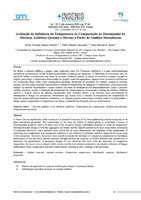Avaliação da influência da temperatura de compactação no desempenho de misturas asfálticas quentes e mornas a partir de análises mecanicistas
Date
2019-12-16Author
Johann Kulzer, Paola Nadine
Pereira Rossato, Fábio
Spies, Tania Betina S.
Metadata
Show full item recordAbstract
No Brasil, a mistura asfáltica a quente, mais conhecida como CA (Concreto Asfáltico), é a mais tradicionalmente utilizada na pavimentação devido às boas propriedades mecânicas que apresenta. A fabricação da mesma por meio de usinas de asfalto é considerada uma fonte de poluição ambiental quando se atenta ao excessivo consumo energético exigido para atingir a temperatura determinada em projeto, tanto dos agregados e ligante como da mistura asfáltica em sua composição final, tendo como consequência produção demasiada de poluentes. No entanto, surgem as misturas
mornas, que tem como principal característica a redução da temperatura de usinagem e compactação, com consequente redução na emissão de poluentes e menor impacto nas áreas de abrangência dos empreendimentos. Logo, o
presente trabalho objetivou avaliar a influência da temperatura de compactação no desempenho à fadiga de misturas asfálticas
quentes e mornas, através de análises mecanicistas pelo Software SisPav e de cálculos, para determinação do desempenho à fadiga nos pavimentos. Percebeu-se que mesmo com a redução de temperatura de compactação as misturas mornas obtiveram melhores resultados, e as misturas quentes apresentaram redução notável de desempenho à fadiga quando compactadas a temperaturas não ideais, resultando em fissuração precoce do pavimento. In Brazil, the hot asphalt mix, better known as CA(Asphalt Concrete), is the most traditionally used in paving due to its good mechanical properties. The manufacture of the same by means of asphalt plants is considered a source of environmental pollution when it is taken care of the excessive energy consumption required to reach the temperature determined in the design of both the aggregates and binder and the asphalt mixture in its final composition, production of pollutants. However, warm mixtures arise, which has as main characteristic the reduction of the temperature of machining and compaction, with consequent reduction in the emission of pollutants and less impact in the scope areas of the enterprises. Therefore, the present work aimed to evaluate the influence of compaction temperature on the fatigue performance of hot and warm asphalt mixtures, through mechanistic analysis by SisPav Software and calculations. to determine the performance of pavement fatigue. It was observed that even with the reduction of compaction temperature the warm mixes obtained better results, and the hot mixtures presented a remarkable reduction of fatigue performance when compacted at non-ideal temperatures, resulting in early cracking of the pavement
URI
info:eu-repo/semantics/altIdentifier/url/https://revistas.fio.unam.edu.ar/index.php/masingenio/article/view/149/503https://hdl.handle.net/20.500.12219/3235
Collections
- Revista +INGENIO [65]
The following license files are associated with this item:




